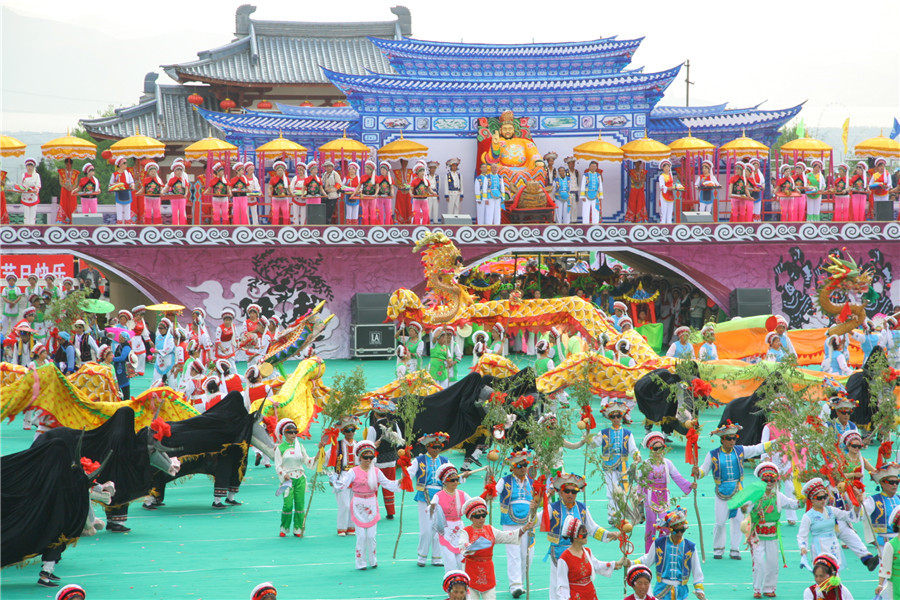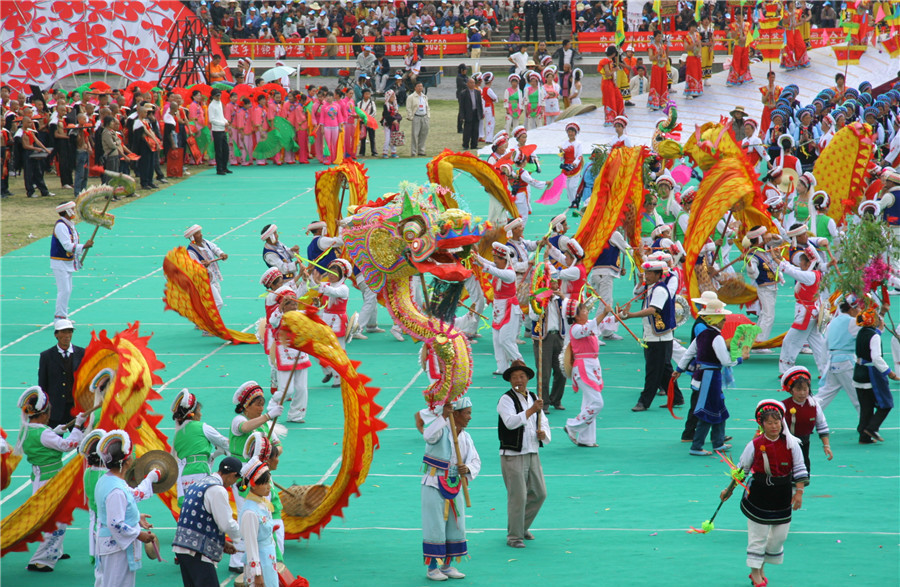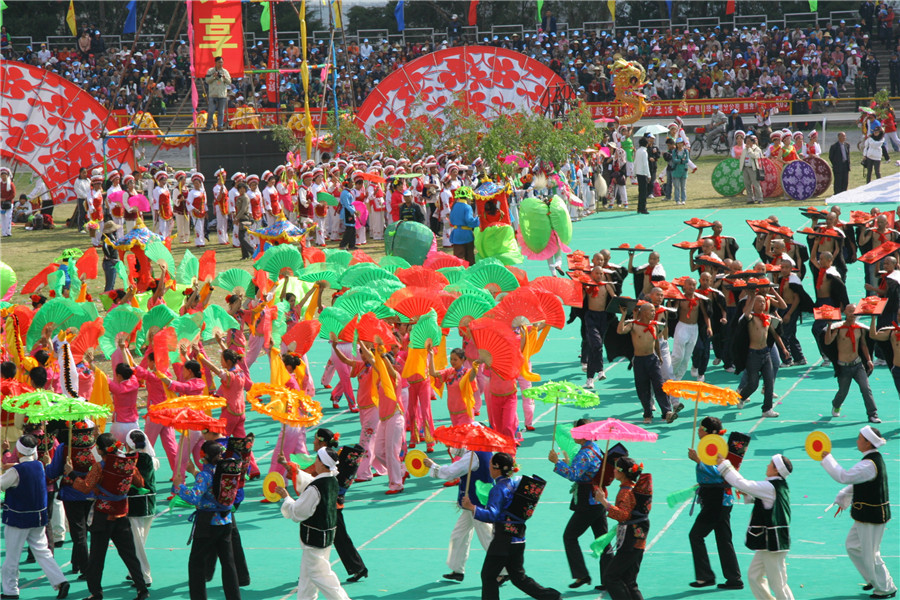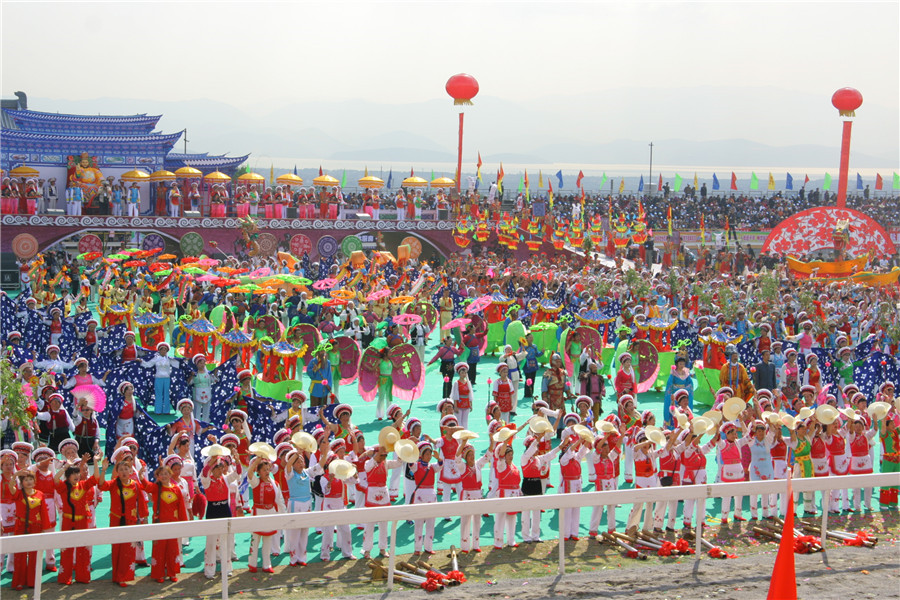March Street (Sanyuejie) Festival of Bai Ethnic Minority in Dali
Chinese Name:大理白族三月街
English Name: March Street (Sanyuejie) Festival of Bai Ethnic Minority in Dali
The March Street Festival, known as Sanyuejie, is one of the most significant traditional celebrations of the Bai ethnic minority in Dali, Yunnan Province. This vibrant festival typically takes place on the 15th day of the third lunar month and lasts for several days, attracting both locals and tourists who come to experience the unique culture, customs, and festivities of the Bai people.
Overview
The March Street Festival is a time for the Bai community to celebrate the arrival of spring, pay homage to their ancestors, and strengthen community bonds. It is characterized by a variety of activities, including traditional music and dance performances, local food fairs, and various competitions that showcase the rich cultural heritage of the Bai people.
During the festival, the streets of Dali are adorned with colorful decorations, and stalls selling local handicrafts, snacks, and traditional Bai clothing line the streets. The atmosphere is lively and filled with the sounds of music, laughter, and the aroma of delicious foods.
Key Activities
Traditional Performances
One of the highlights of the March Street Festival is the various performances that take place throughout the celebration. Dancers in traditional Bai attire perform folk dances, showcasing their vibrant culture. Instruments such as the “Erhu” (two-stringed fiddle), “Pipa” (Chinese lute), and drums accompany the performances, creating a festive atmosphere.
Cultural Exhibitions
The festival also features exhibitions of Bai handicrafts, including tie-dyeing, embroidery, and pottery. Local artisans display their skills, allowing visitors to see the intricate craftsmanship that characterizes Bai culture.
Culinary Delights
Food is an essential aspect of the March Street Festival. Vendors offer a wide range of traditional Bai dishes, including “Er Kuai” (rice cakes), “Dali yogurt,” and various meat and vegetable dishes. The festival provides an excellent opportunity for attendees to savor the unique flavors of Bai cuisine.
Sports and Competitions
Various traditional sports and games are organized during the festival, including tug-of-war, dragon boat races, and archery contests. These activities not only provide entertainment but also promote teamwork and community spirit among participants.
Ancestor Worship
A significant aspect of the festival is the practice of ancestor worship. The Bai people set up altars and make offerings to honor their ancestors, reflecting their deep respect for family heritage and traditions. This ritual is often accompanied by prayers for good fortune and a prosperous year ahead.
Conclusion
The March Street Festival of the Bai ethnic minority in Dali is a vibrant celebration of culture, community, and tradition. With its colorful performances, delicious food, and rich cultural exhibitions, the festival offers a unique glimpse into the lives and customs of the Bai people, making it a must-see event for anyone visiting the region. Visitors can immerse themselves in the festive atmosphere, engage with local customs, and appreciate the beauty of Bai culture during this joyous celebration.

Dali March Street Festival
The Dali March Street Festival is the grandest traditional festival for the diverse ethnic groups in Dali. Officially designated as an ethnic festival by the Standing Committee of the Dali Bai Autonomous Prefecture People’s Congress in 1992, it is held annually from the 15th to the 21st day of the third lunar month, lasting for seven days. Each year, millions of people attend the March Street Festival, attracting numerous participants from both domestic and international locations, making it the most significant holiday for the Bai ethnic group.
Named for its occurrence in the third lunar month, the Dali March Street Festival is the largest annual folk market event in Yunnan, integrating commerce, cultural and sports activities, culinary experiences, and local customs. Historical documents, including the “Chronicles of the Bai Kingdom,” Li Yuanyang’s “Yunnan Comprehensive Gazetteer,” Xu Xiake’s “Travel Diary of Yunnan,” and the “Draft of Dali County Gazetteer,” record that the March Street Festival was originally known as Guanyin Street or Guanyin Market. It gradually evolved from the customs of worshiping Guanyin, dating back to the Tang Dynasty’s Yonghui era. The festival has flourished through the ages, reflecting the grandeur of past times with the lines, “Once prosperous for several springs and autumns, millions of coins flow like water; exquisite goods from Sichuan, Guangxi, Suzhou, and Hangzhou, the marketplace crowned in Asia” (from Qing Dynasty poet Li Xiexi’s “Bamboo Branch Verse”). It boasts a history of approximately 1,300 years.
From the 15th to the 21st day of the third lunar month each year, millions of people come to the March Street Festival from within Yunnan and from countries such as Myanmar and Thailand. The main features of the festival include:
- Material Exchange: A wide range of goods such as medicinal herbs, local specialties, livestock, agricultural tools, general merchandise, daily necessities, tea, candy, food items, handicrafts, and jewelry.
- Ethnic Sports and Cultural Performances: Events like horse racing, wrestling, archery, shooting, martial arts, chess, and ball games.
- Artistic Performances: Large-scale ethnic and folk performances such as the octagonal drum, whip dance, dragon dance, lion dance, clam crane dance, and flower boat race, along with mass singing competitions.
In addition to the local Bai and Han ethnic groups, participants from Yi, Tibetan, and many other ethnic groups actively take part, creating an unprecedented and bustling atmosphere. The ancient city of Dali is adorned with colorful lights, and “flower mountains” made from various flowers and plants are constructed outdoors, creating a stunningly vibrant and unique environment that transforms Dali into a magical world.
The March Street Festival serves as a grand event for the people of western Yunnan to showcase and exchange their economic and cultural heritage. It integrates the history, economy, culture, and customs of the Bai and other ethnic groups, playing a significant role in social and economic development, and having a profound impact both domestically and in Southeast Asia.

 7 Days GolfingTour
7 Days GolfingTour
 8 Days Group Tour
8 Days Group Tour
 8 Days Yunnan Tour
8 Days Yunnan Tour
 7 Days Shangri La Hiking
7 Days Shangri La Hiking
 11 Days Yunnan Tour
11 Days Yunnan Tour
 6 Days Yuanyang Terraces
6 Days Yuanyang Terraces
 11 Days Yunnan Tour
11 Days Yunnan Tour
 8 Days South Yunnan
8 Days South Yunnan
 7 Days Tea Tour
7 Days Tea Tour
 8 Days Muslim Tour
8 Days Muslim Tour
 12 Days Self-Driving
12 Days Self-Driving
 4 Days Haba Climbing
4 Days Haba Climbing
 Tiger Leaping Gorge
Tiger Leaping Gorge
 Stone Forest
Stone Forest
 Yunnan-Tibet
Yunnan-Tibet
 Hani Rice Terraces
Hani Rice Terraces
 Kunming
Kunming
 Lijiang
Lijiang
 Shangri-la
Shangri-la
 Dali
Dali
 XishuangBanna
XishuangBanna
 Honghe
Honghe
 Kunming
Kunming
 Lijiang
Lijiang
 Shangri-la
Shangri-la
 Yuanyang Rice Terraces
Yuanyang Rice Terraces
 Nujiang
Nujiang
 XishuangBanna
XishuangBanna
 Spring City Golf
Spring City Golf
 Snow Mountain Golf
Snow Mountain Golf
 Stone Mountain Golf
Stone Mountain Golf












